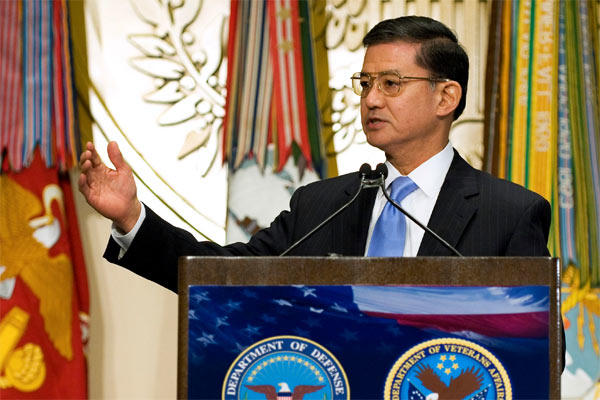Department of Veterans Affairs Secretary Eric Shinseki on Wednesday told a Senate panel that advance funding for all VA operations would not solve all the department problems in the event of another government shutdown.
Shinseki told lawmakers previously that he could not say whether advance funding – which the VA now gets for health care programs – would be a good idea. He told the House Veterans Affairs Committee last year the administration would have to look at the impact on other federal departments.
On Wednesday, he told the Senate Veterans Affairs Committee that advance funding has worked out for VA patients and employees and would seem “to make sense for our other accounts [operations].”
But then he indicated that advance funding probably would not help since other agencies that the VA must deal with do not have the same kind of protection.
“In the case of veteran benefits, we can’t process a claim within our own confines,” he said. “To process a claim, we have to go to Social Security to validate other disabilities, go to the IRS to validate ... threshold income requirements. We deal with [the Defense Department]. We deal with the Department of Education [for] the GI Bill, the Department of Labor on employability issues.”
“The best way for us to be meeting our full mission would be to have a budget for the federal government every year,” he said. “That would make all of our work much easier.”
Advance appropriation for the entire VA has been backed by veterans groups and many in Congress for several years. And that support became stronger late last year when the government shutdown nearly caused the interruption of VA disability and pension checks from going out. Currently, these programs are considered discretionary.
The VA leadership’s appearance before the Senate panel on Wednesday came four hours after the same lawmakers, along with their House of Representatives counterparts, convened a hearing with members of several veterans and military service advocacy groups.
While there were some differences among the priorities stated by the advocacy groups, most were in agreement on one recommendation -- expanding advance year funding to all VA programs, and not only health care.
Also Wednesday, the VA told senators that it anticipates treating more veterans with traumatic brain injury in coming years but at less cost, an expectation reflected in a proposed 2015 budget that sees TBI funding reduced from $232 billion to $229 billion.
Dr. Robert Petzel, under secretary for health at the VA, said actual spending on serious TBI cases has gone down slightly in the past few years, even though the VA had budgeted for increases. And the department expects the decrease to continue.
“We’ve had an almost 70 percent decline in the number of severely injured traumatic brain injured patients going into our polytrauma centers,” he said. “The number of people with mild or moderate TBI has continued to increase. The cost of taking care of those people is much, much less than it is providing care for the patients that end up in our polytrauma program.
He also said that much of the care for mild to moderate TBI patients comes out of other parts of the budget, which are seeing increases. This includes budgeting for post-traumatic stress disorder and other mental health problems, such as depression.
Petzel explained the lower budgeting for TBI during a hearing on the VA’s 2015 budget before the Senate Veterans Affairs Committee.
The VA is seeking $164 billion next year, including $68.4 billion for healthcare spending and $95.6 billion for disability compensation, pensions and other mandatory programs.
The budget also includes more money aimed at bringing down the controversial disability claims backlog and ending chronic veteran homelessness – two goals set by VA Secretary Eric Shinseki when he took over the job in 2009. Both goals are supposed to be met by the end of 2015.
Shinseki told Senators on Wednesday that the department has reduced its backlog by 40 percent and has an accuracy rate of better than 90 percent among claims it has processed – contentions that even veterans groups supportive of the VA have questioned.
Members of the Senate panel did not dispute the claims, though that may be owed to the fact ranking member Sen. Richard Burr, R-N.C., was absent from the hearing. Burr has previously questioned the VA’s numbers.
Shinseki told the Senators that before he took over the VA in 2009 there was no such thing as a backlog – defined now as an initial claim that has not been adjudicated within 125 days.
“Five years ago we had no standard,” he said. “We established one and have not changed it.”
-- Bryant Jordan can be reached at bryant.jordan@monster.com


























